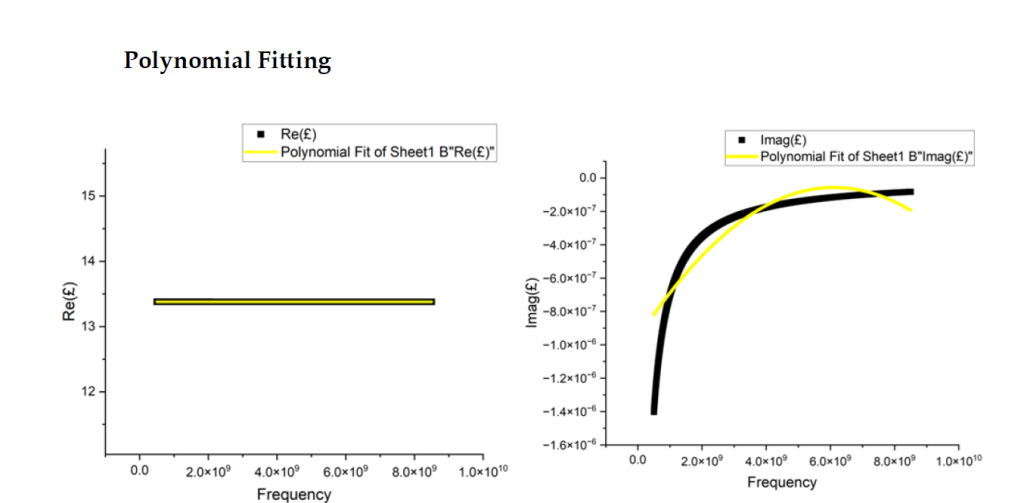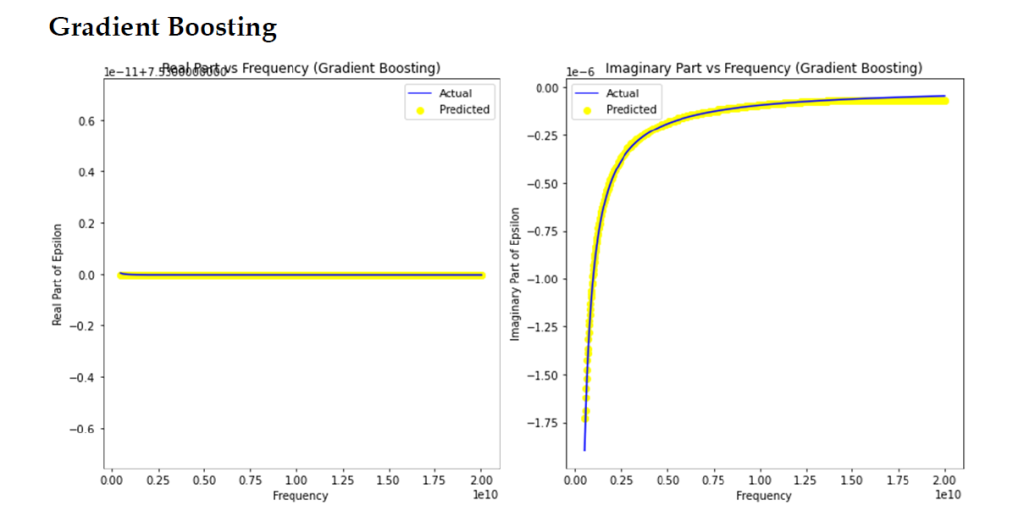Founder Chancellor Meets the Honourable CM of Andhra Pradesh
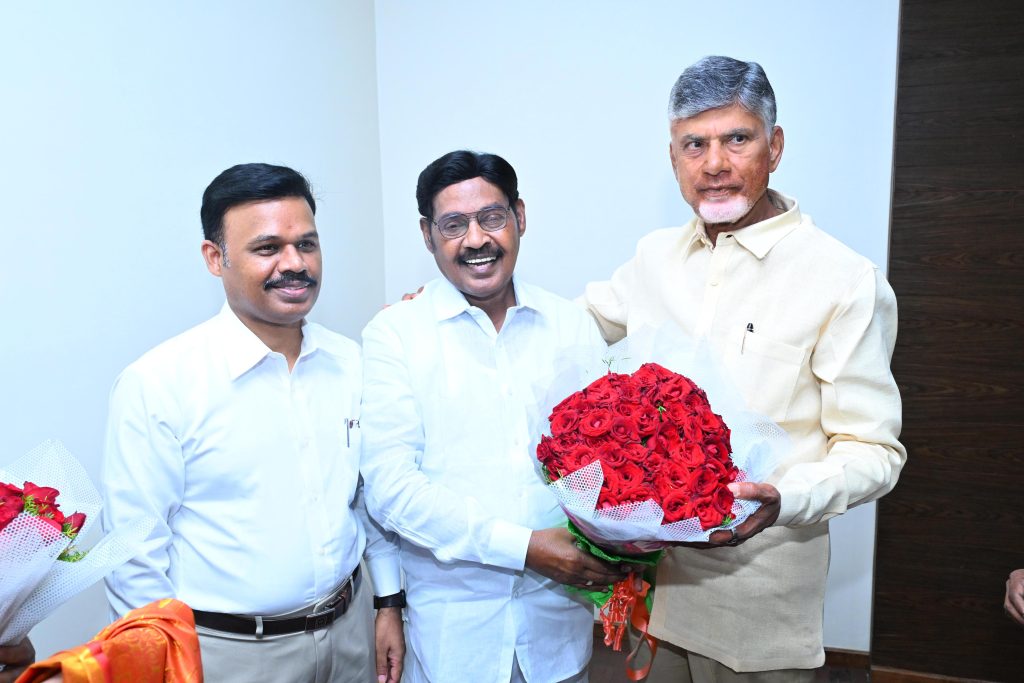
SRM University-AP Founder Chancellor Dr T R Paarivendhar and Pro-Chancellor Dr P Sathyanarayanan met with the Honourable Chief Minister of Andhra Pradesh, Shri Nara Chandrababu Naidu, to extend their congratulations on his fourth tenure as the head of the state government. Upon assuming the office as the Chief Minister after his landslide victory, Shri Chandrababu Naidu generously welcomed the institution leaders with the assurance and support for the university’s development and the provision of necessary facilities.
Founder Chancellor Dr T R Paarivendhar remarked, “Shri Chandrababu Naidu is a visionary leader with an ambitious dream to revitalise the governance, economy, and businesses in the capital city of Amaravati. As the first educational institute to plant roots in Amaravati soil, we confidently look forward to the cordial support in developing SRM University-AP into a world-class university.”
Pro-Chancellor of SRM University-AP, Dr P Sathyanarayanan, congratulated the veteran leader on his political triumph and conveyed his best for his successful tenure. He said, “With Shri Chandrababu Naidu, an exemplary commander at the apex of the state, Andhra Pradesh is set to transcend the frontiers of socio-economic development. SRM University-AP as an academic university will flourish with the development of Andhra Pradesh.”
SRM University-AP was established in the year 2017 when Shri Chandrababu Naidu was presiding as the Chief Minister of the State. Currently housing the School of Engineering and Sciences, Easwari School of Liberal Arts and Paari School of Business, the university has a visionary plan to extend its campus to include a law school, medical school and other emerging schools and programmes. Shri Chandrababu Naidu-led state support will propel the progress of the varsity, helping to provide quality education, employment and academic capital to the ground roots of Andhra Pradesh.
- Published in News
Joining Hands to Save Lives: Celebrating World Blood Donor’s Day
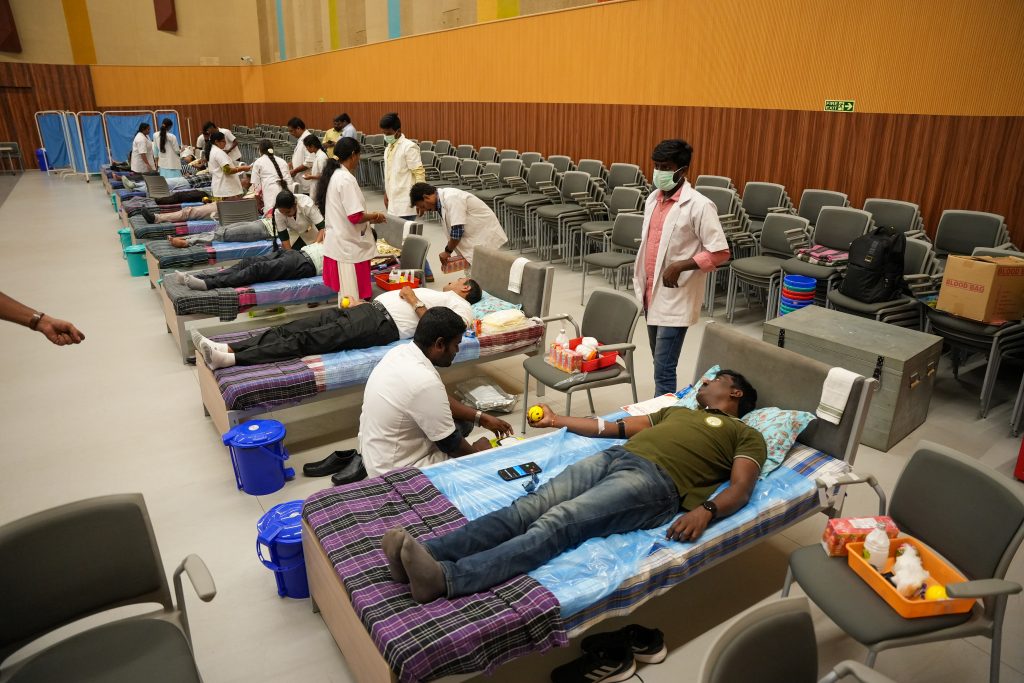
In a commendable display of community spirit and dedication to saving lives, SRM University-AP hosted a Blood Donation Camp to honour World Blood Donor’s Day. Organised in collaboration with Guntur Medical College, the event marked a significant success and underscored the university’s steadfast commitment to societal welfare.
The camp’s inauguration was graced by Chief Guest Mr Venugopal Reddy, Collector of the Guntur Region. He was accompanied by Dr V Kiran Kumar, Chief Surgeon, and his team from the Government Blood Centre at Government General Hospital-Guntur, Dr R Premkumar, Registrar of SRM University-AP, and Ms Revathi Balakrishnan, Associate Director of Student Affairs, and other key dignitaries witnessed the inaugural ceremony.
In his opening address, Mr Venugopal Reddy stressed the crucial significance of blood donation, emphasising that “Blood is a vital component that cannot be artificially manufactured in laboratories.”
Registrar Dr Premkumar emphasised the importance of donating blood and highlighted that “donation continues to be the sole way to guarantee an ongoing supply of this life-saving elixir.” He stressed the significance of these camps in cultivating a culture of altruism and accountability within the university community.
The university enthusiastically participates in coordinating frequent blood donation drives to support the community and meet the demand for blood donations. The event also served as a platform to dispel myths surrounding blood donation, thereby encouraging broader participation. The students, faculty, and staff of SRM University-AP showed immense enthusiasm in donating blood, significantly contributing to the camp’s outstanding success.
Adding to the day’s significance, Dr Karthik Rajendran, Associate Dean-QAR, was honoured with the Lifesaver Award by the Indian Red Cross Society. This prestigious accolade was bestowed in recognition of his substantial contributions to blood donation and his unwavering commitment to saving lives.
The varsity’s Blood Donation Camp exemplifies the profound impact of collective effort in addressing critical healthcare needs. It highlights the university’s unwavering commitment to making a positive societal impact and reinforces the importance of regular blood donation and community service.
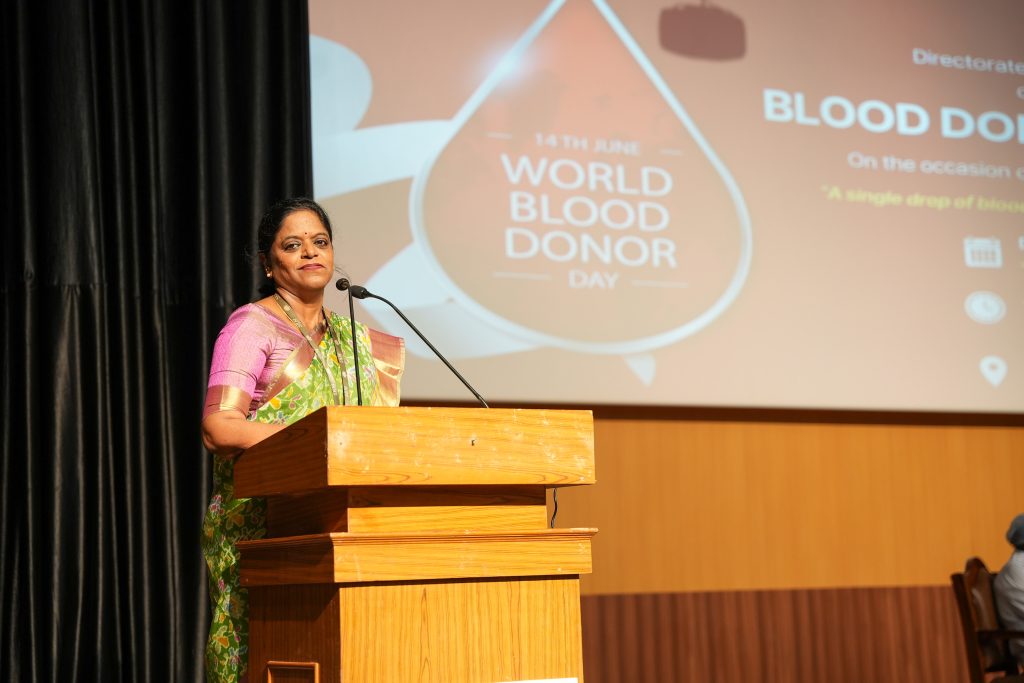
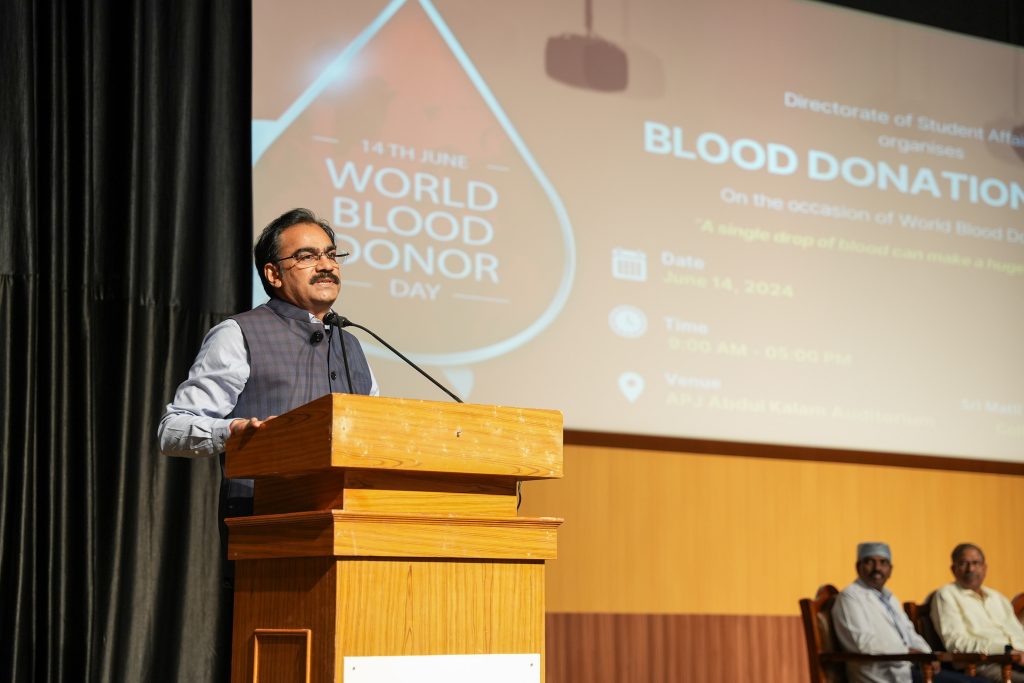
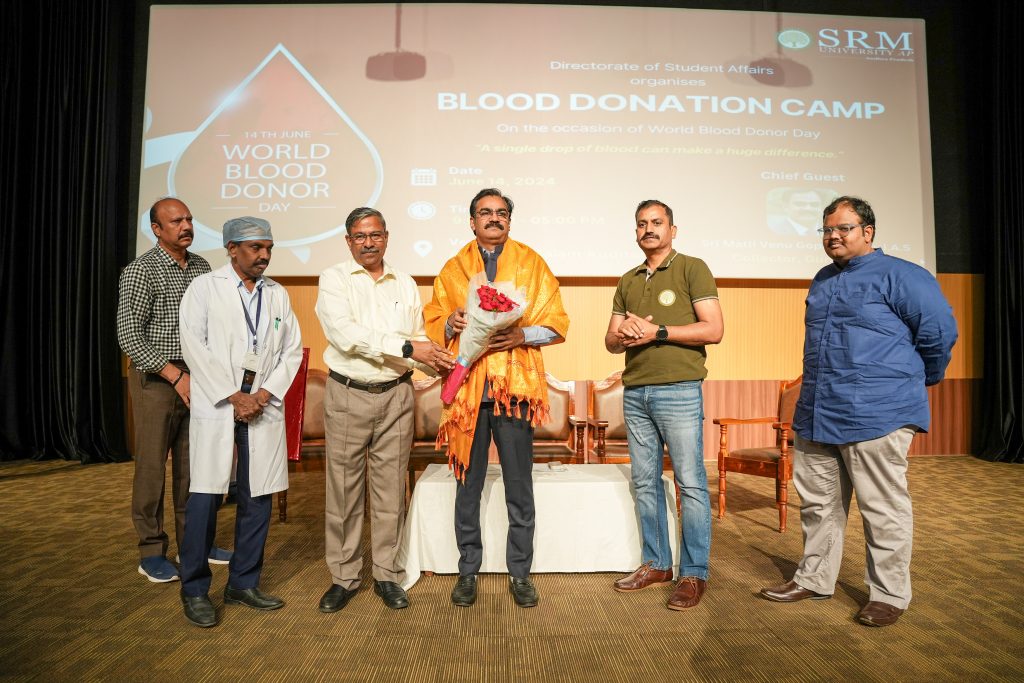
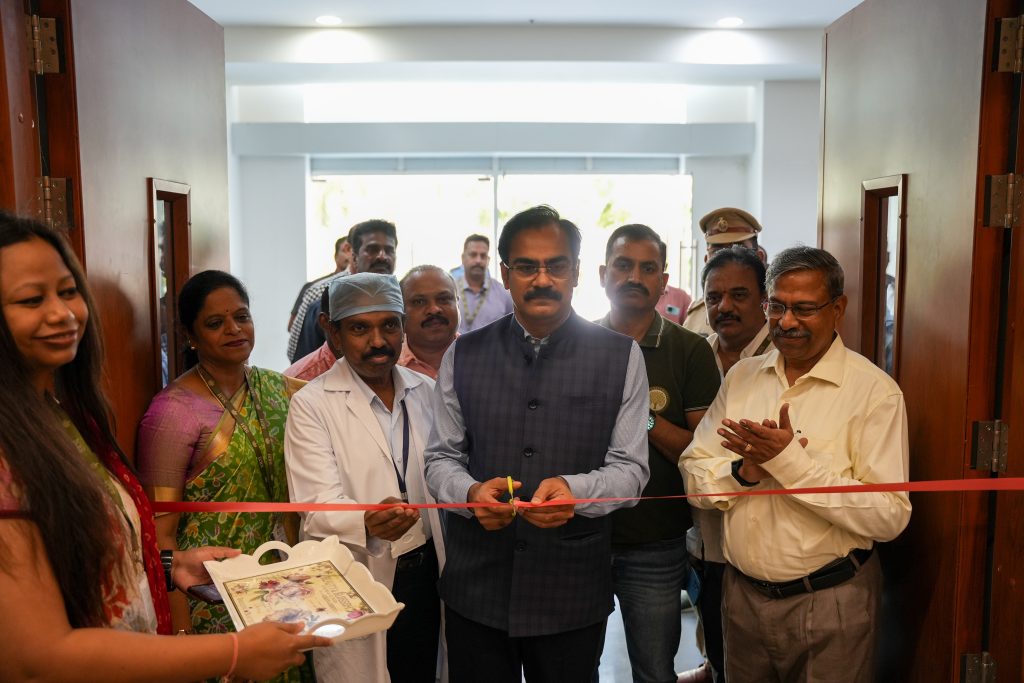
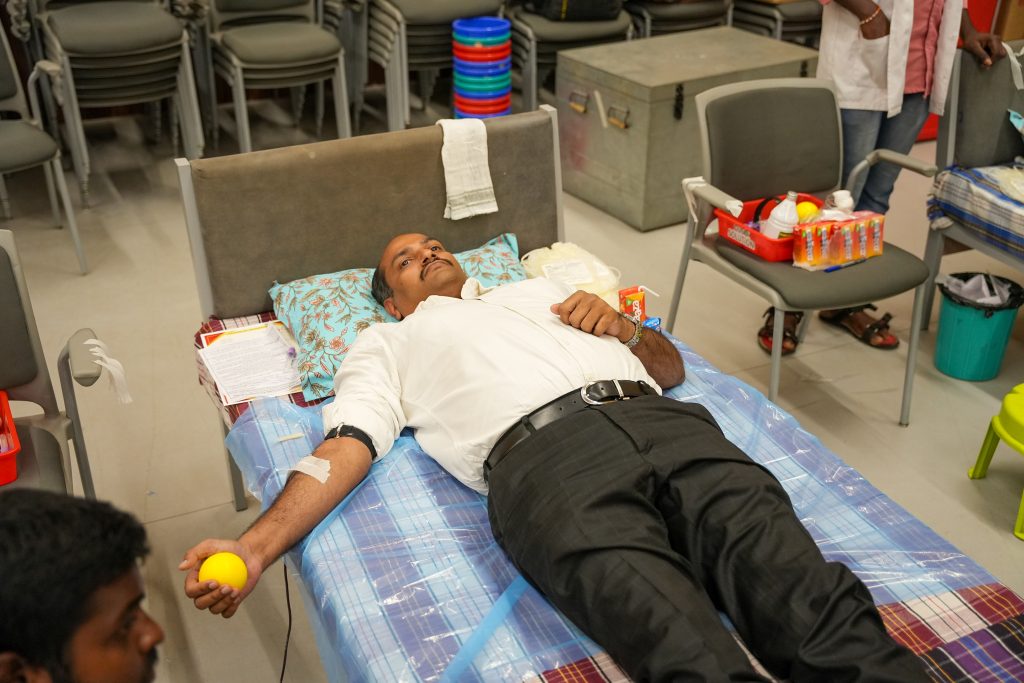
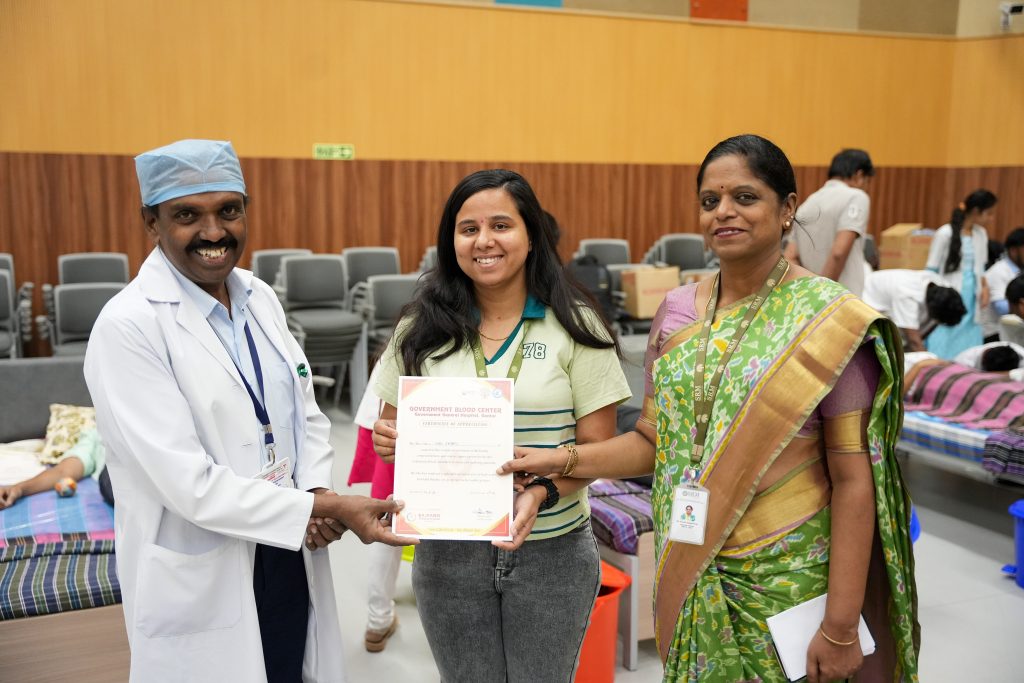
- Published in Departmental News, News, student affairs news, Students Affairs Events, University Event
Exploring the Exciting Potential of 6G Networking
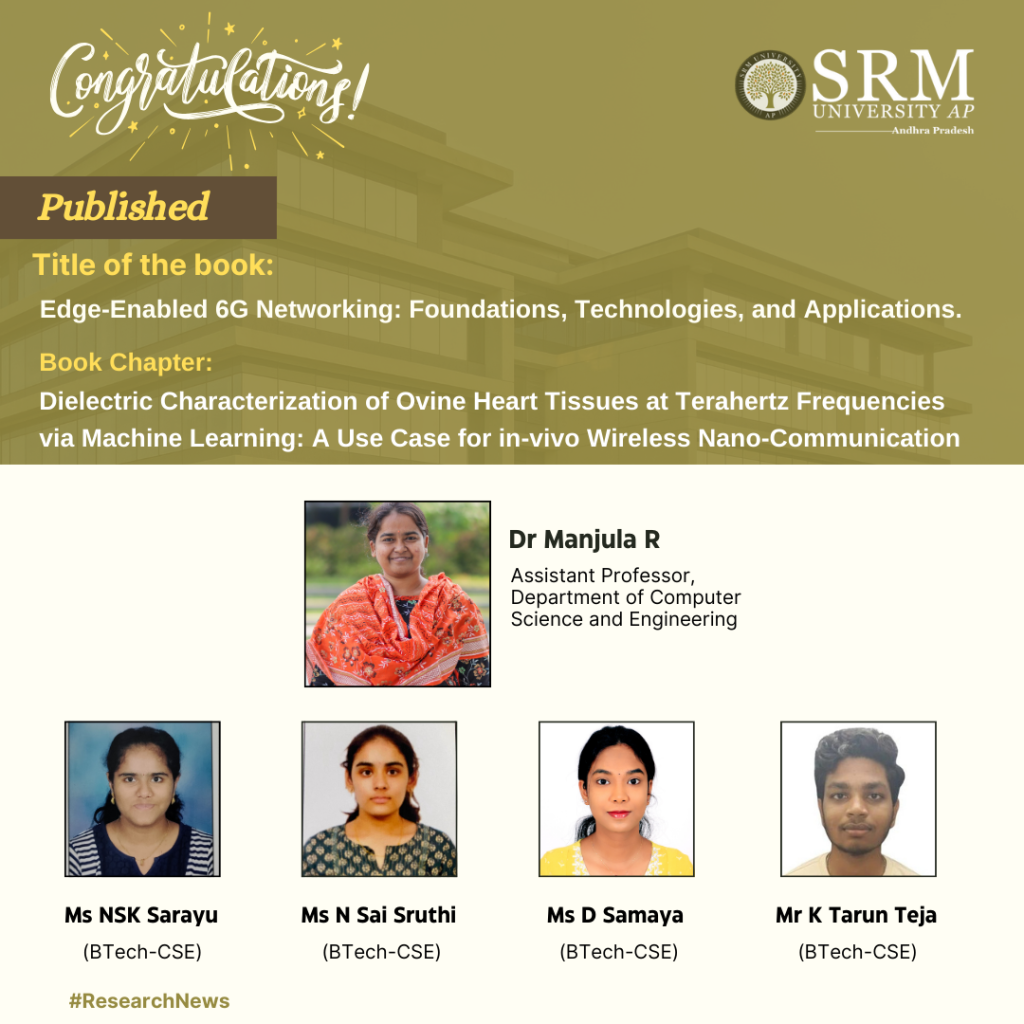
The Department of Computer Science and Engineering is proud to announce the acceptance of the book chapter titled, Dielectric Characterization of Ovine Heart Tissues at Terahertz Frequencies via Machine Learning: A Use Case for in-vivo Wireless Nano-Communication in the book, “Edge-Enabled 6G Networking: Foundations, Technologies, and Applications.” The book chapter by Dr Manjula R and her students, Ms NSK Sarayu, Ms N Sai Sruthi, Ms D Samaya, and Mr K Tarun Teja from the department caters to UG/PG and PhD students, educational institutions, and medical healthcare sectors. Dr Manjula’s research doesn’t just underscore the significance of understanding the dielectric properties of heart tissues but also highlights the transformative potential of machine learning in predicting, diagnosing and offering therapeutic interventions equipped with real-time monitoring capabilities. The research also lays the groundwork for future advancements in this field, facilitating the development of more efficient and reliable in-vivo sensing technologies.
Abstract of the Book Chapter:
A new generation of sensing, processing, and communicating devices at the size of a few cubic micrometers are made possible by nanotechnology. Such tiny devices will transform healthcare applications and open up new possibilities for in-body settings. A thorough understanding of the in-vivo channel characteristics is essential to achieve efficient communication between the nanonodes floating in the circulatory system (here, it is the heart) and the gateway devices fixed in the skin. This entails one to have accurate knowledge on the dielectric properties (permittivity and conductivity) of cardiac tissues in terahertz band (0.1 to 10 THz). This research examines the strength of the machine learning models in accurate calculation of the dielectric properties of the cardiac tissues. Initially, we generate the data using 3-pole Debye Model and then use machine learning models (Linear Regression, Polynomial Regression, Gradient Boosting, and KNN), on this data, to estimate the dielectric properties. We compare the values predicted by machine learning models with those given by the analytical model. Our investigation shows that the Gradient Boosting method has better prediction performance. Further, we have also validated these results using Origin software employing curve fitting technique. In addition, the research also contributes to the study of data expansion by predicting unknown data based on available experimental data, emphasizing the broader applicability of machine learning in biomedical research. The study’s conclusions enhance areas like non-invasive sensing in the context of 6G, which may improve data and monitoring in a networked healthcare environment.
- Published in CSE NEWS, Departmental News, News, Research News
Examining Karnataka’s Mandate for Signboards: Paper by Dr Vineeth Thomas
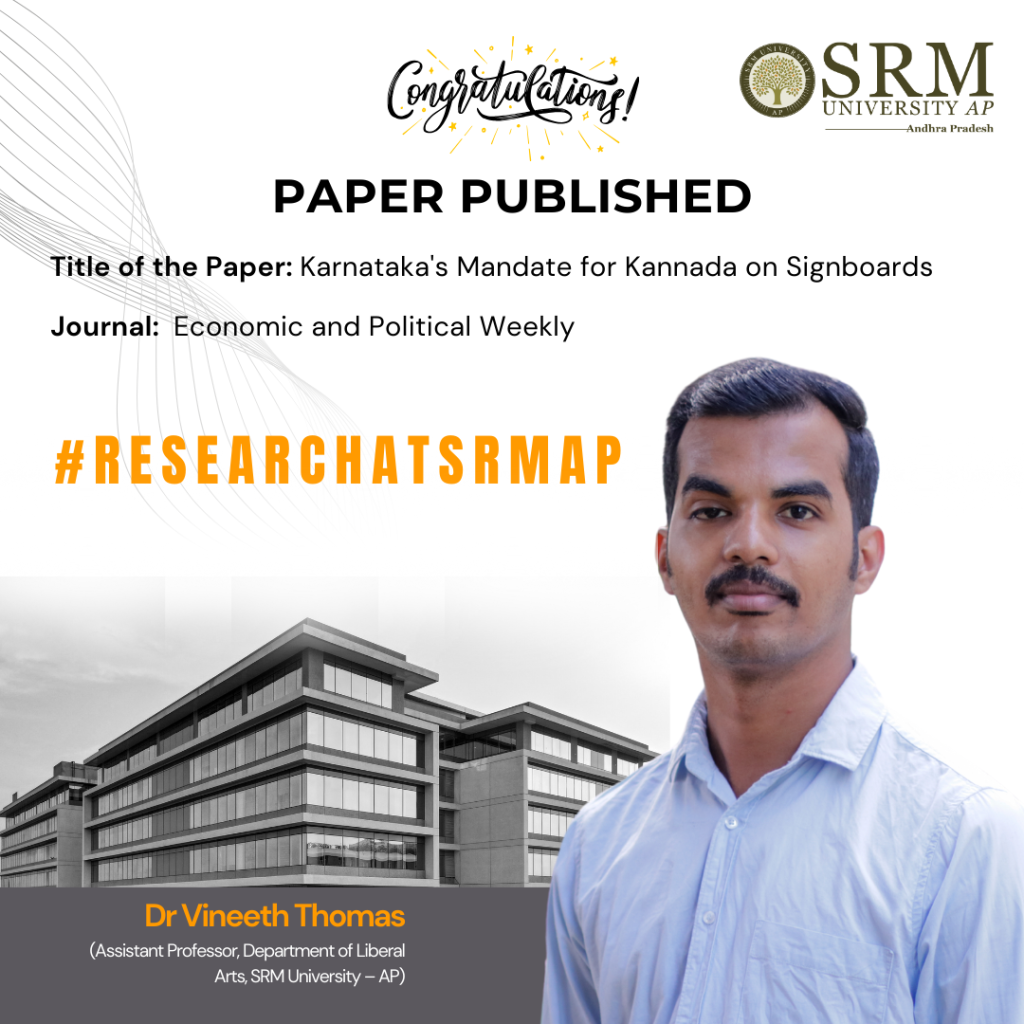
In a research paper published in Economic and Political Weekly, Dr Vineeth Thomas, an Assistant Professor at the Department of Liberal Arts, delves into the socio-political and economic implications of the “Karnataka’s Mandate for Kannada on Signboards” amendment. The article highlights the social and cultural significance of the amendment and raises awareness about the potential economic challenges it may pose. This insightful paper not only makes for an engaging read but also serves as a valuable resource for policymakers and politicians, bringing attention to the practical and social implications of the amendment.
Abstract
The Kannada Language Comprehensive Development (Amendment) Bill, 2024, ratified by the Karnataka Legislative Assembly and Legislative Council, stands as a legislative landmark with profound implications. This commentary critically analyses the socio-economic-political implications, unravelling the intricate web of influences that the Kannada Language Comprehensive Development Bill introduces within the diverse and dynamic landscape of Karnataka.
Citation
Roshmi Antony, Vineeth Thomas, Lulubala Nayak (2024)-, Karnataka’s Mandate for Kannada on Signboards, Economic and Political Weekly, ISSN (Online) – 2349-8846 (SCOPUS /ABDC Indexed)
- Published in Departmental News, Liberal Arts News, News, Research News
SRM University-AP Forges Partnership with AIMA
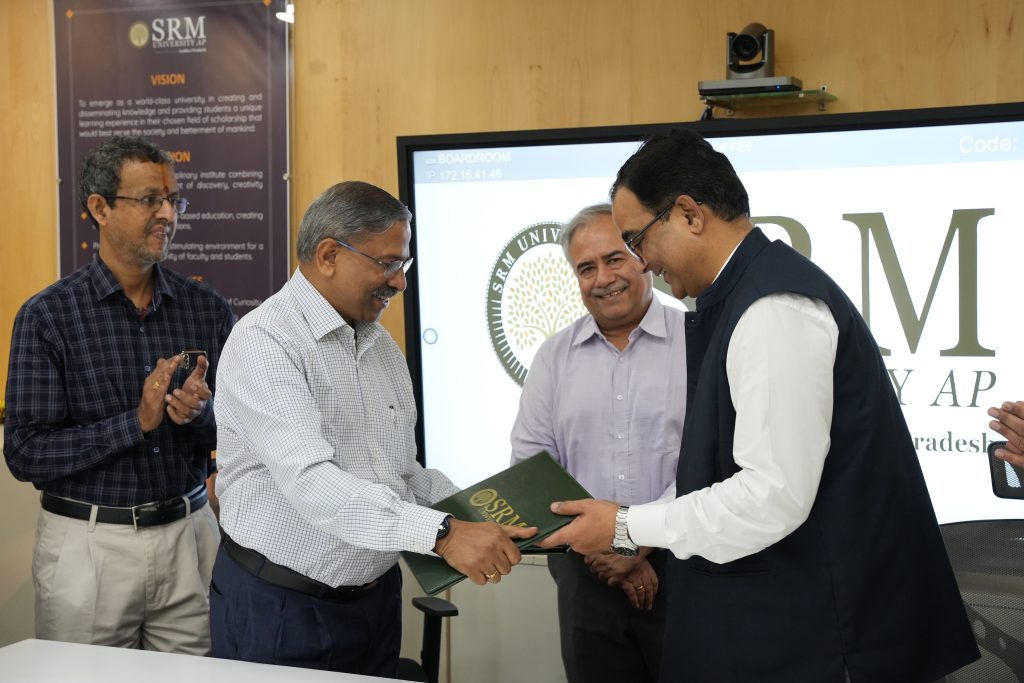
In a historic moment, Prof. Rohit Singh, Director of the Centre for Management Education at the All India Management Association (AIMA), and Dr R Premkumar, Registrar of SRM University-AP, signed a memorandum of understanding (MoU). This MoU aims to foster collaboration between the two institutions and introduce a part-time PhD programme for working professionals.
The signing ceremony was attended by distinguished personalities including Dr Ganesh Singh, Professor and Programme Director at the Centre for Management Education; Prof. Manoj K Arora, Vice Chancellor of SRM AP; Prof. Bharadwaj Sivakumaran, Dean of Paari School of Business; Prof. Ranjit Thapa, Dean of Research; Dr Vinayak Kalluri, Dean of Academic Affairs & Controller of Examinations; Dr Maheshwar Dwivedy, Associate Dean of Practice School & Associate Professor; Dr Mahesh Kumar Ravva, Assistant Dean of Research; Dr Satyanarayana Duvvuri, Professor of Practice; Dr CA Mahalakshmi Mudliar, Associate Professor and Head of the Department of Management; Dr A Lakshmana Rao, Associate Professor and Head of the Department of Commerce; and Dr Lalita Mohan Mohapatra, Assistant Professor, along with other faculty members and students.
To date, more than 250 working professionals have earned their PhDs through AIMA. The institution also boasts an illustrious alumni network employed in leading companies such as Samsung, Schneider Electric, Accenture, Amazon, and Tata.
In his address, Vice Chancellor Prof. Manoj K Arora underscored the importance of a supportive research environment and the critical role of the student-guide relationship. Prof. Arora also insisted that the faculty undergo a specialised programme on “how to effectively guide a PhD.” Dr Rohit Singh, Director of AIMA, elaborated on the strategic significance in the broader educational landscape, especially for working professionals.
Members of the academic leadership, faculty, and PhD scholars joined together to congratulate the varsity on its initiative to shake hands with AIMA.
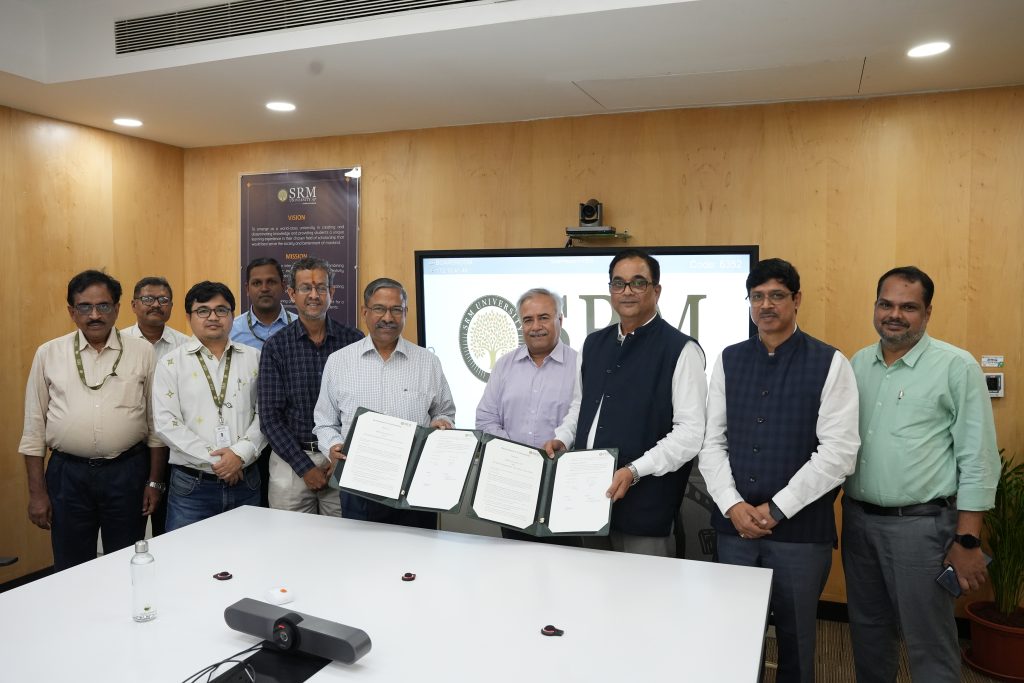
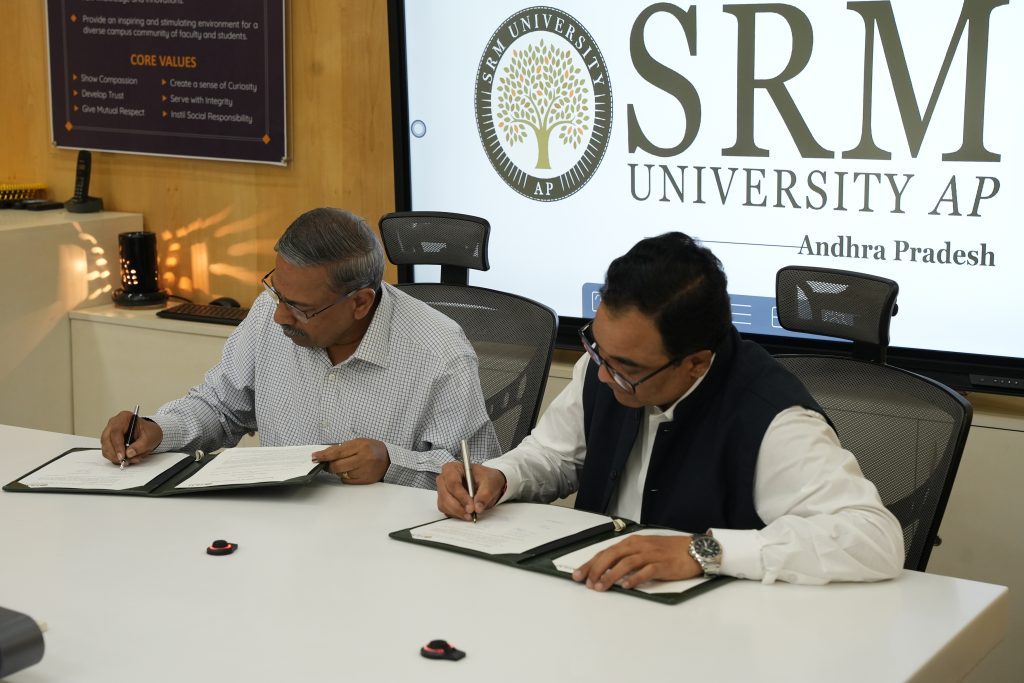
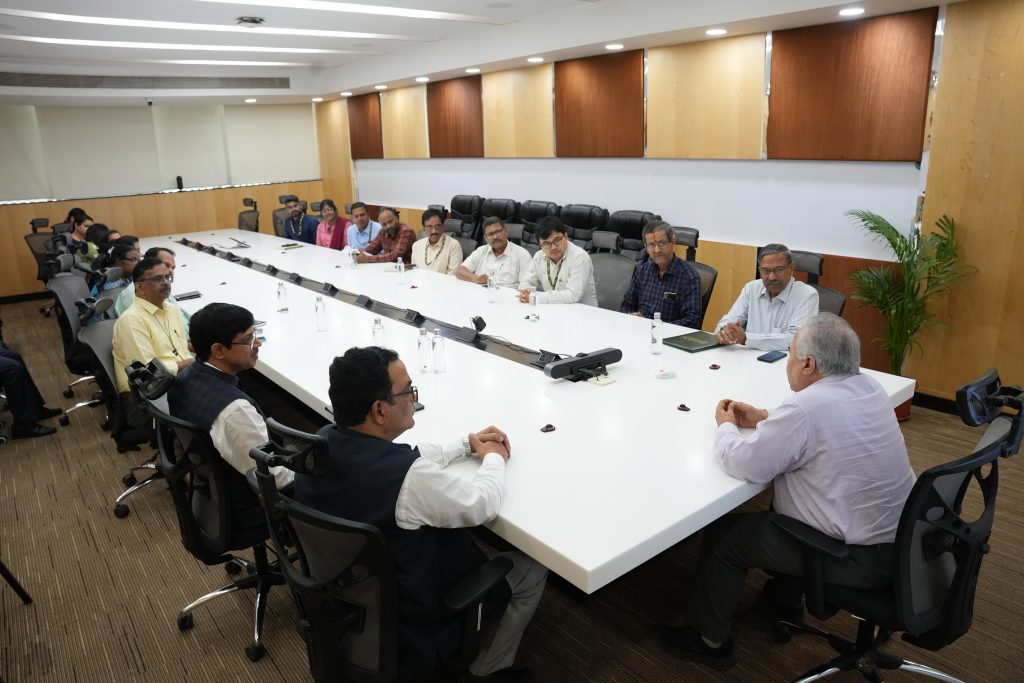
- Published in Departmental News, MoU, News, Paari Current Happenings
Groundbreaking Research on Advanced Technology Nodes
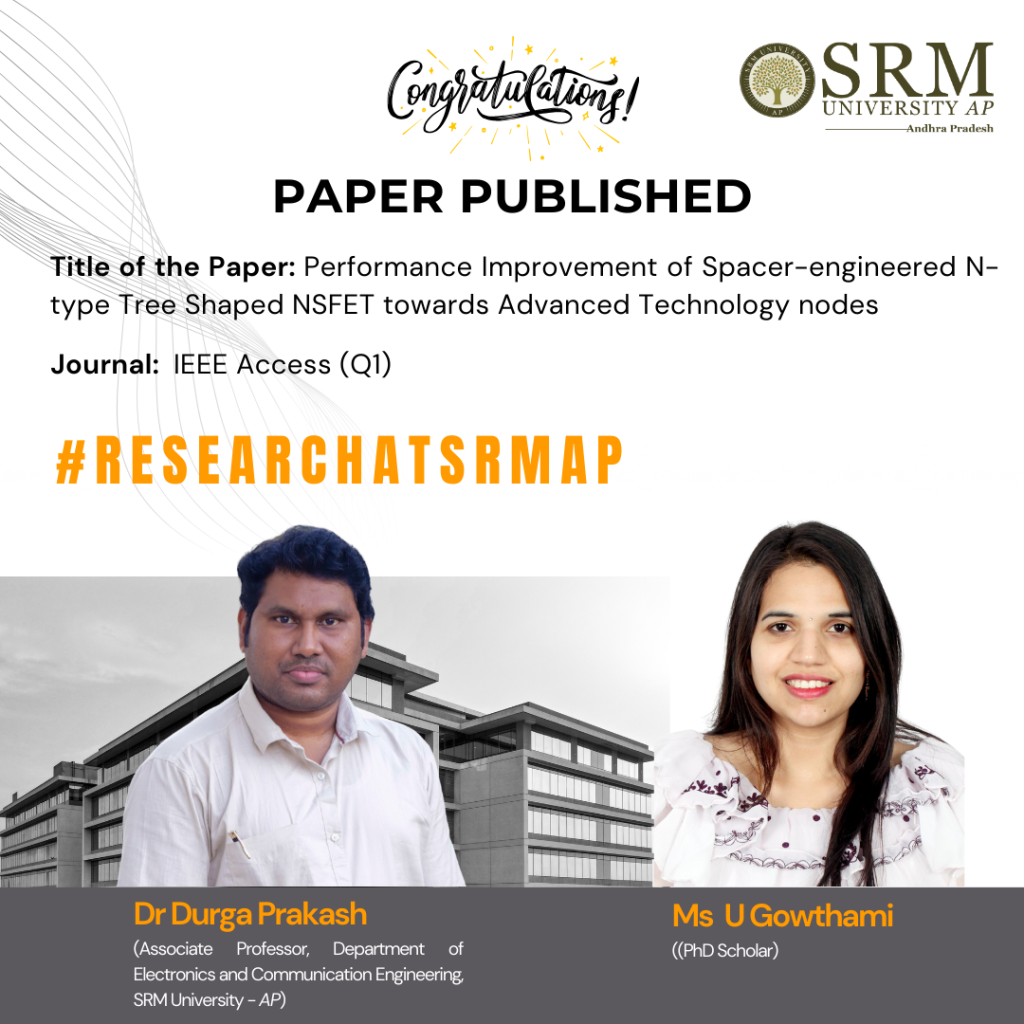
Dr M Durga Prakash, Assistant Professor in the Department of Electronics and Communication Engineering, and his PhD scholar, Ms U Gowthami, have published a research paper titled “Performance Improvement of Spacer-engineered N-type Tree Shaped NSFET towards Advanced Technology nodes” in the Q1 journal, IEEE Access. The paper has an impact factor of 3.9 and will pave the way for significant advancements in the field.
Here’s an abstract of their research paper
Abstract:
Scaling gate lengths deep is most reliable with tree-shaped Nanosheet FETS (NSFET). This paper uses TCAD simulations to study the 12nm gate length (LG) n-type Tree-shaped NSFET with a stack of high-k dielectric (HfO2) and (SiO2) spacers. The Tree-shaped NFET device features high on-current (ION) and low off-current (IOFF) with T(NS) = 5 nm, W(NS) = 25 nm, WIB=5nm, and HIB = 25 nm. Comparison of single- and dual-k spacer 3D devices and DC properties are shown. Because fringing fields with spacer dielectric prolong the effective gate length, the dual-k device has the highest ION / IOFF ratio, 109, compared to 107. This research also examines where work function, inter bridge height, breadth, gate lengths, temperature, and analog/RF and DC metrics affect the device. The suggested device has good electrical properties at 12 nm LG, with DIBL = 23 mV/V, SS = 62 mV/dec, and switching ratio (ION / IOFF) = 109. The device’s performance proves Moore’s law applies to lower technological nodes, enabling scalability.
The link to the article- https://ieeexplore.ieee.org/document/10499264 DOI: 10.1109/ACCESS.2024.3388504


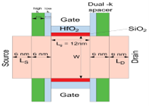
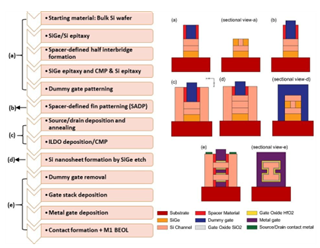
- Published in Departmental News, ECE NEWS, News, Research News
Uncovering the Factors Influencing Income Inequality in Rural Indian Households: A Comprehensive Study
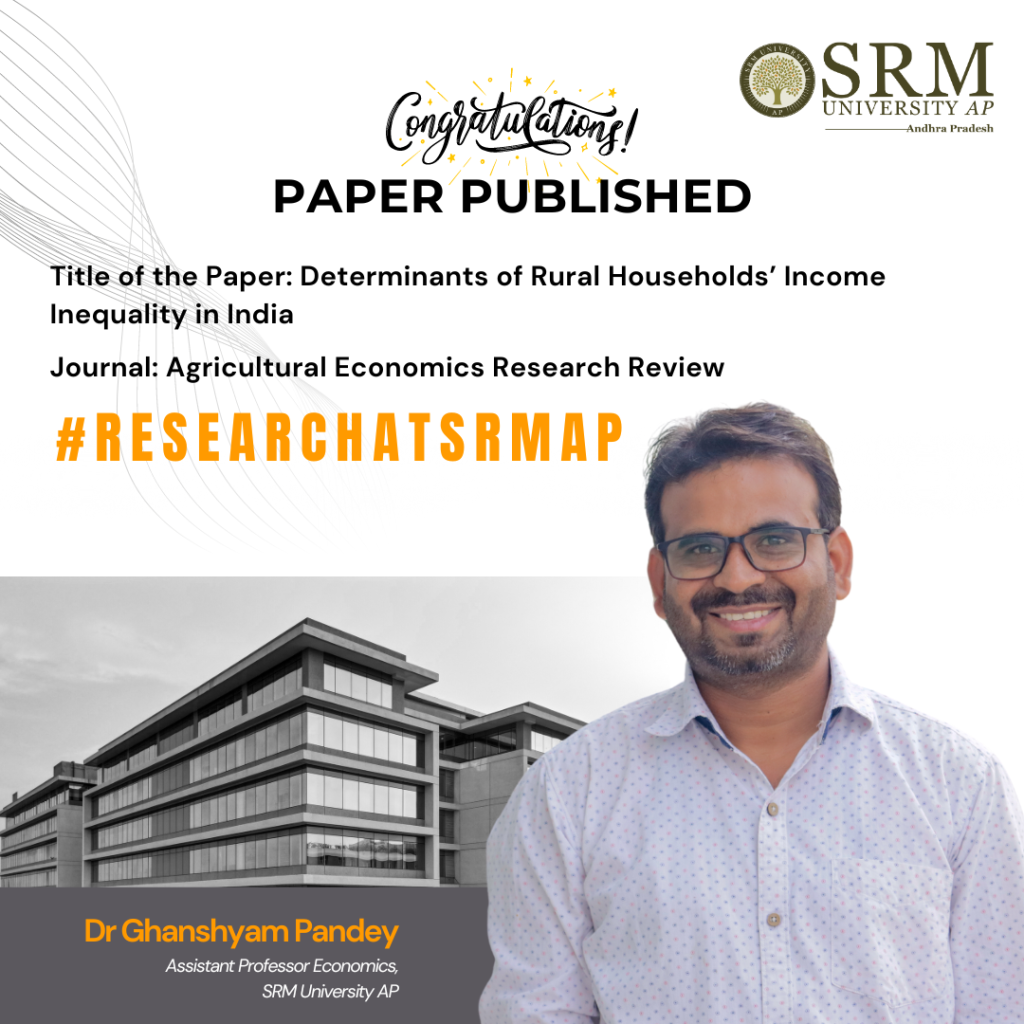
The Department of Economics takes immense pride in announcing the publication of the research paper, “Determinants of Rural Households’ Income Inequality in India” authored by Dr Ghanshyam Pandey, Assistant Professor. The paper has been published in the Journal of Agricultural Economics Research Review (ABDC-C), and has an impact factor of 0.19. Dr Pandey’s paper examines the factors that determine income inequality among rural farm households in India and discusses the implications of the findings for policymakers, practitioners, and researchers. The study highlights how addressing the identified factors could potentially reduce income inequality among rural farm households and improve the overall well-being of the rural population.
Abstract
This study has identified the drivers of income inequality in rural India using IHDS 2011–12 national-level survey. The inequality decomposition methodology developed by Fields (2003) based on a two-way regression methodology has been used. The study has modified the previous regression based inequality decomposition technique by accounting for diverse income sources and regimes as well as by effectively correcting for selectivity in the various income regimes. The CLAD model has been used to distinguish the determinants of income inequality in rural India. The study has indicated that income inequality in farm households can be attributed to the level of education, family size, caste/social group composition, and composition in land ownership and that family size and land ownership are instrumental primarily due to off-farm labour income. The study has shown that education is a significant factor in income inequality due to its impact on off-farm work income. The study has suggested that a continued increase in variability in land distribution may exacerbate income inequality in households in rural India.
Link to the Article
Pandey G and Devi B (2023). Determinants of rural households’ income inequality in India. (2024). Agricultural Economics Research Review, 36(2), 213-225. https://epubs.icar.org.in/index.php/AERR/article/view/150669

- Published in Departmental News, Economics Current Happenings, Economics News, News, Research News
Dr Pradyut and Students Revolutionise Disease Detection

In the groundbreaking research paper titled “Innovative Web Application Revolutionizing Disease Detection: Empowering Users and Ensuring Accurate Diagnoses,” Dr Pradyut Sanki, Associate Professor at the Department of Electronics and Communication Engineering, along with doctoral scholars Mr P N S B S V Prasad, and Mr Syed Ali Hussain and BTech students Ms Pragya Gupta and Ms Swikriti Khadke introduce a cutting-edge web application that aims to revolutionise disease detection and empower users to understand their health conditions.Their research paper published in the Journal of Electronic Materials has an impact factor of 2.1.
Abstract:
This paper presents an innovative enhancement aimed at revolutionizing disease detection and providing users with a reliable source of information for accurate diagnoses of their symptoms. Our open-source initiative combines a user-friendly interface design with advanced machine learning models, establishing a new benchmark for accuracy and enabling integration with even higher-performing models. We address the pervasive challenges of misinformation and misdiagnosis associated with online symptom searches, presenting a significant advancement in disease detection. Leveraging cutting-edge machine learning techniques.
Practical and Social Implications:
The practical implementation of our research means that people can use our smart tool to get better advice about their symptoms. This could lead to quicker and more accurate diagnoses, helping people get the right treatment sooner. Socially, our research could reduce the spread of false information online about health issues, leading to better-informed decisions and potentially improving overall public health.
Future Research Plans:
As a future research plan the students and faculty together plan to refine and expand their smart tool to make it even more accurate and helpful. They aim to incorporate feedback from users and collaborate with other experts to continually improve the technology. Additionally, they plan to explore ways to make the tool more accessible to a wider range of people and to address any potential biases in the data or algorithms. Overall, they are committed to advancing healthcare technology for the benefit of society.
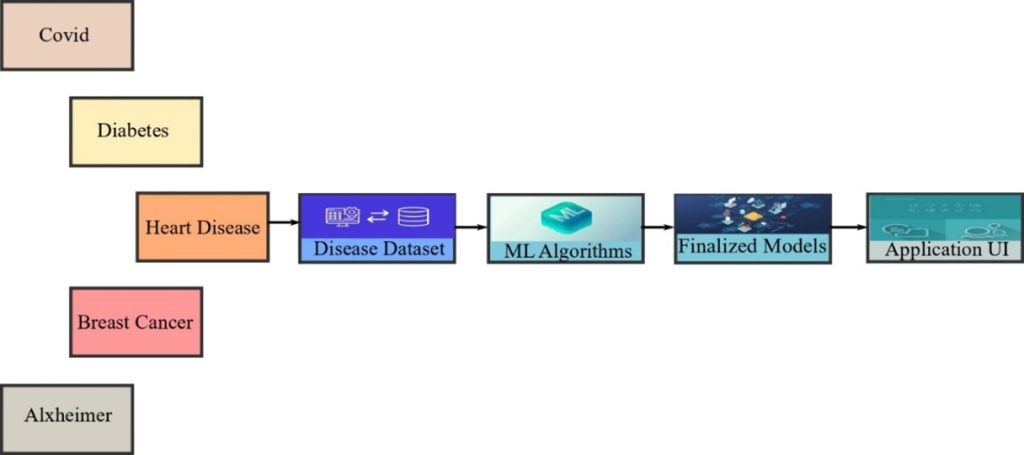
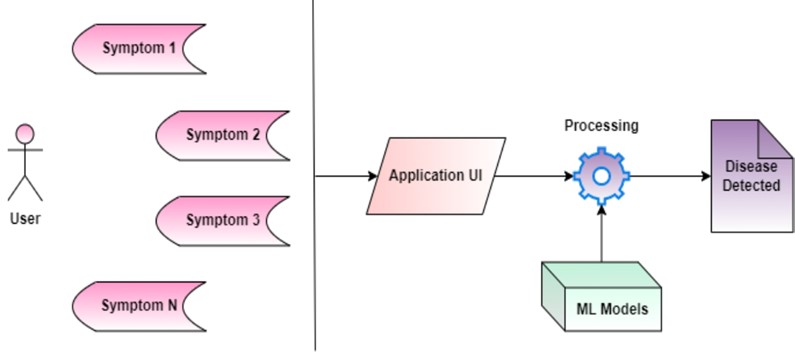
- Published in Departmental News, ECE NEWS, News, Research News
A Study on Self-Learning Controller Design for DC-DC Power Converters
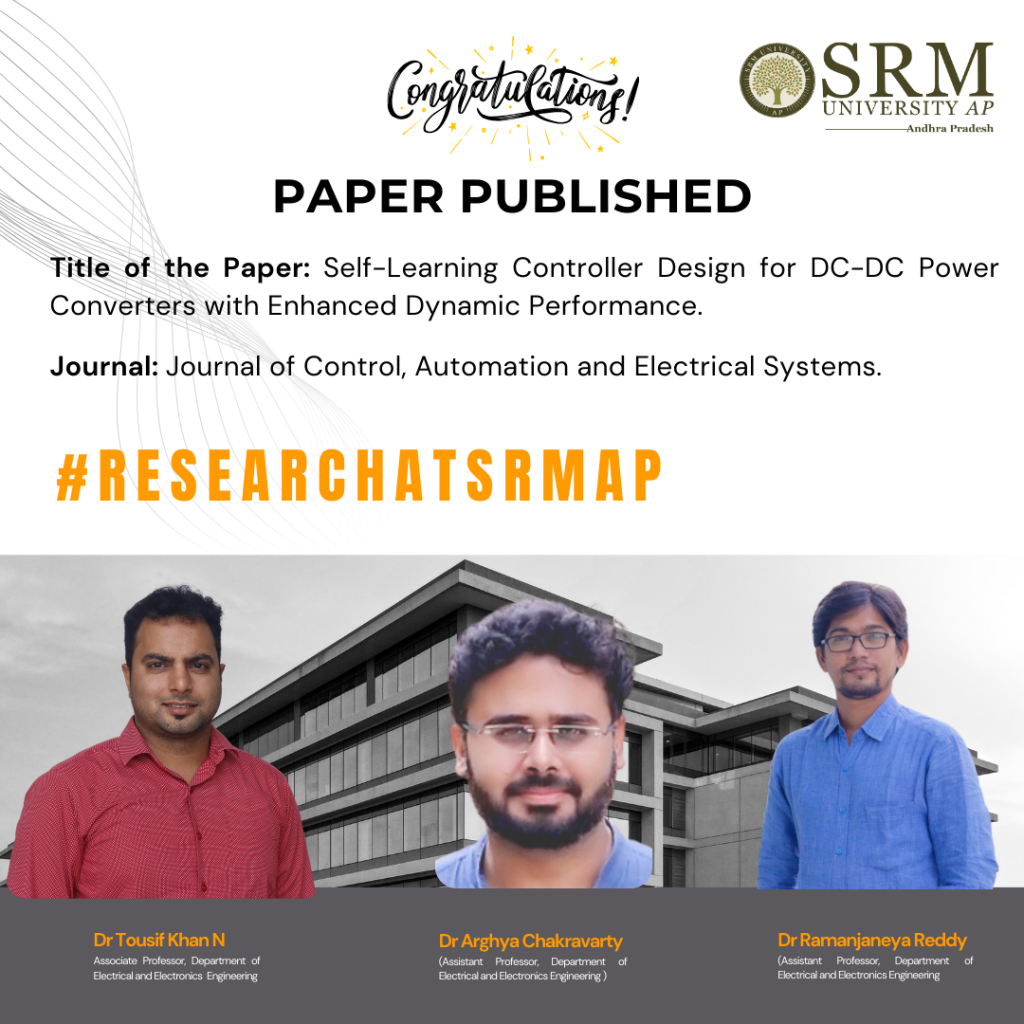
It is with great pleasure that we announce the publication of a research paper titled “Self-Learning Controller Design for DC-DC Power Converters with Enhanced Dynamic Performance,” jointly authored by Dr Tousif Khan N, Associate Professor, Department of Electrical and Electronics Engineering, and Dr Ramanjaneya Reddy & Dr Arghya Chakravarty, Assistant Professors, Department of Electrical and Electronics Engineering. The research paper introduces a novel self-learning control for precise output voltage tracking in DC-DC buck power converters.
Abstract:
This article introduces a self-learning robust control approach for accurate output voltage tracking in DC-DC buck power converters, focusing on scenarios with high precision requirements and significant load uncertainties. The method employs a simple online neural network to swiftly estimate unexpected load changes and disturbances across a wide range. Operating within a backstepping framework, the controller utilises neural network-learned uncertainties to enhance stability and improve dynamic and steady-state performance of both output voltage and inductor current. Extensive numerical simulations and practical experiments on a laboratory prototype demonstrate substantial enhancements in dynamic performance with a 94% reduction in settling time and precise steady-state tracking. The reliability of the proposed controller is further supported by the consistency between computational and experimental outcomes, showcasing its potential for real-world applications.
Practical implementations:
The proposed controller can be implemented/used for robotics applications, industrial processes, and medical equipment where precise control is needed.
Future research plans:
The following are the potential future directions of the proposed work;
(i) Design and development of the proposed self-learning neural network-based control for DC-DC buck converter systems with real-time DC sources, such as solar PV and fuel cells, experiencing highly intermittent input voltage changes.
(ii) Incorporating inductor current constraints and output voltage limitations into the proposed controller would also be an avenue worth exploring.
We congratulate the professors for their valuable contribution and look forward to future breakthroughs in this area.
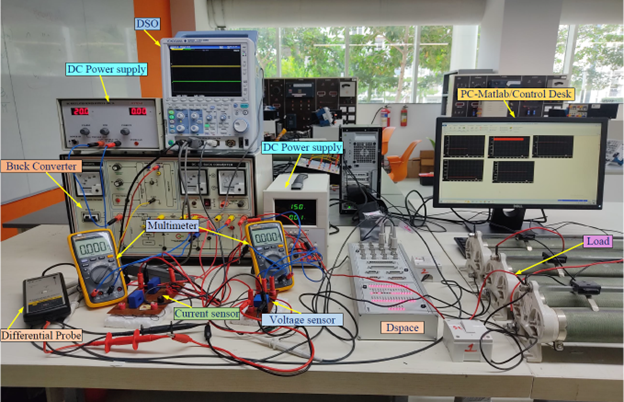
- Published in Departmental News, EEE NEWS, News, Research News
Alumni Talk: Transitioning Career Pathways
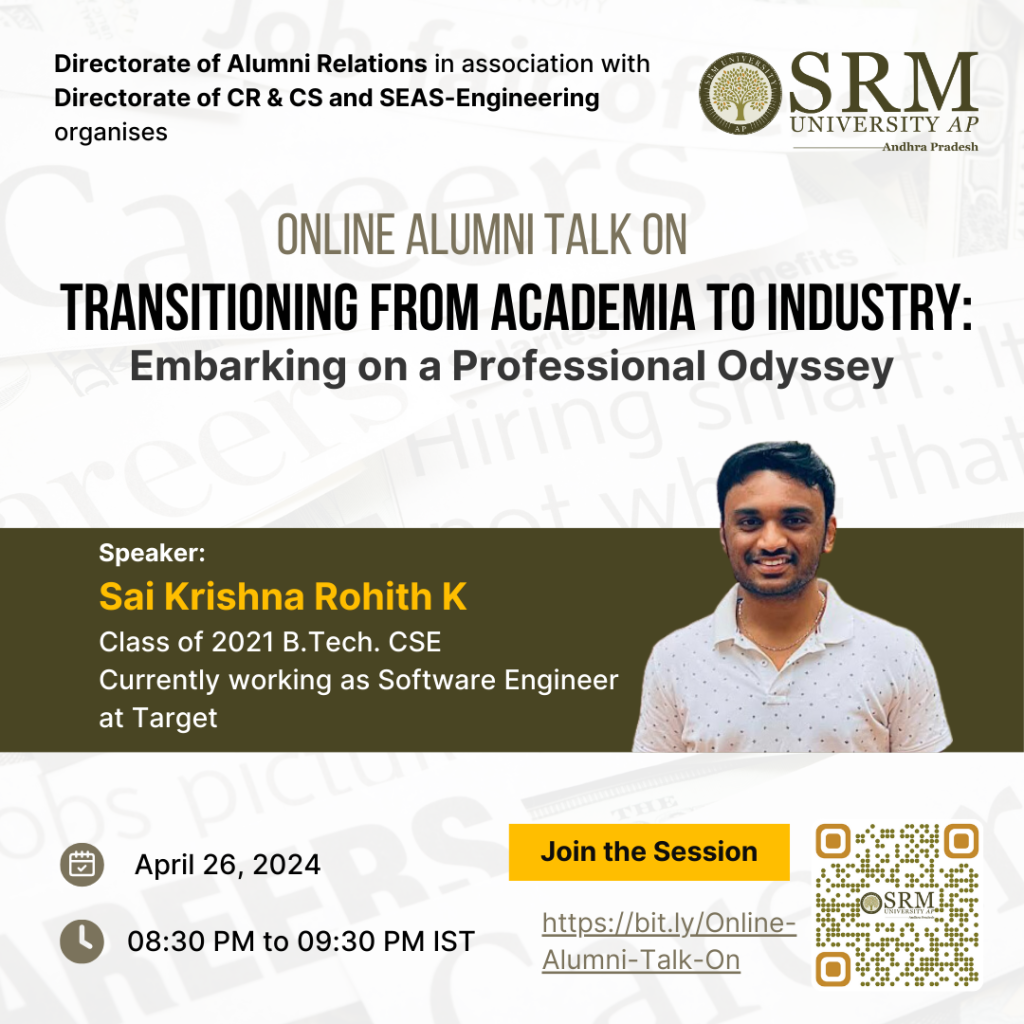
The Directorate of Alumni Relations, in collaboration with the Directorate of Corporate Relations and Career Services (CR&CS) and SEAS Engineering at SRM University-AP, is organising a one-of-a-kind alumni talk titled, “Transitioning from Academia to Industry: Embarking on a Professional Odyssey.” The interactive session by Mr Sai Krishna Rohith K, Software Engineer at Target and a former student, Class of 2021 B.Tech Computer Science and Engineering will be conducted online on April 26, 2024.
The upcoming session aims to provide insights into the various challenges that students may encounter while transitioning from their academic life to a professional career. The discussion will delve into the nuances of this significant change, including the skills that will be required to succeed in a professional setting, the expectations that employers may have of new hires, and the adjustments that students may need to make to their daily routines. By addressing these aspects, the session hopes to prepare students for a smooth and successful transition into their desired career paths.
Stay tuned to learn about the exciting nuances of professional life!!


